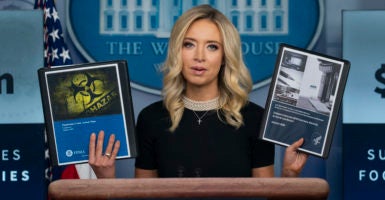The White House pushed back on the media narrative that the Obama administration left behind a pandemic “playbook” for the Trump administration.
White House press secretary Kayleigh McEnany said Friday that the playbook from the Obama administration was an insufficient packet of paper, and that the Trump administration’s own pandemic response exercise in 2019 exposed its shortcomings.
On Thursday, Dr. Rick Bright, a senior adviser at the National Institutes of Health who filed a whistleblower complaint against President Donald Trump, told a House Energy and Commerce subcommittee on health that the administration should have known more about the coronavirus.
As a result, Bright said, “we were not as prepared as we should have been.”
“We missed early warning signals and we forgot important pages from our pandemic playbook,” Bright said. “There will be plenty of time to identify gaps for improvement.”
Much of the mainstream media, including CNN, Politico, and PBS, ran with the narrative that the Obama administration left a pathway for the Trump administration to better handle the coronavirus.
That wasn’t the case., McEnany said during the Friday press briefing.
“Some have erroneously suggested that the Trump administration threw out the pandemic response playbook left by the Obama-Biden administration,” McEnany said, holding up documents from the podium. “What the critics fail to note, however, is that this thin packet of paper was replaced by two detailed, robust pandemic response reports commissioned by the Trump administration.”
“In 2018, the Trump administration issued our pandemic crisis action plan,” she said, adding:
Further, from August 13th to the 16th, the Trump administration conducted the Crimson Contagion 2019 Functional Exercise. This was a pandemic simulation to test the nation’s ability to respond to a large-scale outbreak.
In January of 2020, [the Department of Health and Human Services] issued the Crimson Contagion 2019 Functional Exercise after-action report. This exercise exposed the shortcomings in legacy planning documents, which informed President Trump’s coronavirus response.




























